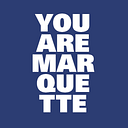Backpack Program works to end food insecurity stigma
The program provides groceries to any Marquette student who is having difficulty accessing food and other basic needs.

By Anna Wallace, communication intern in the Office of Marketing and Communication
Throughout elementary, middle and high school, many schools provide students, particularly those from low-income families, lunch at a reduced price or free of cost.
“But then you get to college and that stops. What do you do then?” Christine Little asks. “Food is a basic right about which a lot of people don’t think twice.”

Little is the manager of campus food recovery and assistance at Marquette which oversees the university’s Backpack Program, a free and confidential service that provides groceries to any Marquette student who is having difficulty accessing affordable, nutritious food and other essential household items.
The program, Little says, is an initiative born out of an eye-opening survey from 2018 which found that 20% of Marquette students have at some point faced food insecurity while attending college.
“That’s one in five,” Little says. “That proves that this issue, while big by the reported numbers, is in many ways silent or invisible. Food insecurity has been linked to college dropout rates, so by removing the stress of where to get healthy food we are supporting not only student health and wellbeing, but also graduation and future success.”
The program offers to students in need food, both fresh and nonperishable, as well as cleaning and personal hygiene products.
The food and other resources come from donations made by organizations across Milwaukee, including Feeding America and Gordon Food Services.
The Marquette University Dental School even makes toothbrush donations.
All of the program’s support, Little says, is indicative of Marquette’s commitment to establish meaningful connections and create a community of women and men for and with others.
The Backpack Program doesn’t offer just physical resources. It also provides students volunteer opportunities to better their themselves and their community, and aims to reduce negative perceptions surrounding, and the false assumptions of those who experience, food insecurity.
The Backpack Program is available to any student, no questions asked, and can be utilized as often as the individual needs. Student leaders within the organization can receive the intakes from the online system, pack bags based off individual needs, and distribute them weekly.
John Brown, a senior studying physical therapy in the College of Health Sciences, volunteers his time at the Backpack Program, where he serves as the director of diversity and inclusion.
“Being aware of the intersectional issues within this national problem is important,” Brown says. “My job is to pay special attention to any cultural stipulations while we pack bags and to also conduct cultural humility training with new volunteers.”
It is the thoughtful, careful consideration demonstrated by the program’s volunteer staff that creates a safe and supportive space for students in need to seek to help.
“As Marquette values cura personalis, care for the whole person, I think the Backpack Program does just that,” says Elizabeth Mantey, a junior studying biomedical sciences in the College of Health Sciences who also servs as the director of external relations for the Backpack Program “We recognize we can’t be our best selves academically, spiritually, mentally and physically without addressing the basic needs of our bodies. By having this program on campus for students to utilize, Marquette students can feel holistically cared for in ways that are not just academic.”
For more information about the Backpack Program, including how to benefit from its services or how to volunteer, visit the program’s webpage on the Marquette University Division of Student Affairs website.
Additionally, the Backpack Program — which regularly uses plastic and paper grocery bags to distribute its resources to students in need — is always looking for more bags. Bag donations can be dropped off at the door on the east side of Mashuda Hall, 1926 W. Wisconsin Ave.











